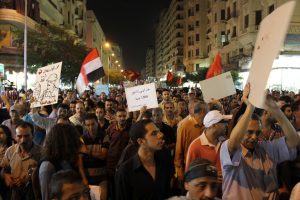 The run-off last week of the Egyptian presidential elections has caused the political and social stage in Egypt to become severely polarized. The second round of voting descended into a bitter competition between two candidates whom together earned only 48% of all the votes in the first round.
The run-off last week of the Egyptian presidential elections has caused the political and social stage in Egypt to become severely polarized. The second round of voting descended into a bitter competition between two candidates whom together earned only 48% of all the votes in the first round.
Earlier in June, in the first round of voting the Muslim Brotherhood candidate Mohammed Morsi received 24.7% which translates to around 5.8 million votes and Ahmed Shafik (the last PM of Mubarak’s administration) got 23.66% which are the votes of 5.5 million Egyptians. The voter turnout was 46% which amounts to 24 million Egyptian votes cast out of a total of 51 million eligible voters.
The results were a shock to the Egyptian street as well as international and local media. Speculation amongst commentators and analysts was that other candidates from the favoured short list would have had better results.
The run off represented a very difficult choice: Ahmed Shafik was the secular candidate, considered to be a remnant of the old regime, with himself announcing that Mubarak was his role model. The other choice was the Islamist University Professor and head of the Freedom and Justice Party and one of the main leaders of the Muslim Brotherhood – Dr. Mohamed Morsi.
Many Egyptians made a decision and I was one of them: we will vote or invalidate our right to vote. Others said that it was not their battle anymore and they were planning to boycott the run off. Most of us didn’t agree with such a course of action – it wasn’t an option for us to not vote, we couldn’t fail the revolution by sending it back to the hands of the old regime or to give it with our own free will to the Islamists.
Others also felt that they had to choose. Since elections are now taking place they have to have their voices and opinions heard. Many Christians, the workers in the tourism sector, authors, artists, actors and journalists thought that Shafik had learnt his lesson and there will be no place for a pharaoh again. They convinced themselves that Shafik will provide a balance to the Islamists who have a majority in parliament, the trade unions and the syndicates and also had the highest representation in the drafting committee of the new constitution. They thought that bringing a secular candidate to the presidential palace with his long expertise in government would bring stability to the country.
Others felt that despite the ideological differences and an objection against their performance during the transitory period, the Brotherhood represents the revolutionary powers of Egypt. So they decided to vote for the Brotherood candidate as a last call to save the revolution. The Salafi’s and other post-revolutionary political parties, such as Al Jamaa El Islamya, April 6, revolutionary socialists and many well known individual opinion leaders called for the people to vote for Morsi.
SCAF took a series of decisions that changed the scene. They gave the right of judicial arrest to military officers against civilians in the same way that civilian police officers had. When the Constitutional Supreme Court issued a verdict that one third of the parliament was unconstitutionally elected, SCAF immediately dissolved parliament and seized back legislative power. They then issued a second constitutional declaration by which they granted themselves a big chunk of presidential powers – making them even more powerful than before the revolution.
It was at this moment that it looked like the only to save the revolution would be through voting for the Brotherhood candidate.
On voting day, the 5 million people who voted for Morsi went and did it again. In addition to them 7 million more people -who either voted for other candidates in the first round or did not vote – voted for Morsi too. Morsi won with only 51.7 %, while Shafik had 48.5%.
The biggest surprise was that the runoff had more votes than the first round. 51% of Egyptian voted – which is around 25.6 million people of which 13.2 million voted for Morsi and 12.3 million voted for Shafik. Invalid votes like mine were cast by almost 0.8 million.
Now for the first time in Egypt’s modern history we have a “freely” elected President. A civilian without a military background, who has a PhD in engineering from America, a leader from the Muslim Brotherhood and a President of a political party who will resign from that position when his term is up – however, it is understood that he will not give up on his 40 years of intellectual and political belongingness to the Brotherhood.
We have to accept the results of the ballot since we are not questioning the electoral process itself. The reasons why he was elected are many, complicated and interrelated. I personally felt relieved that Shafik lost but I do not feel happy that Morsi has won.
What would make me very happy is if the constitutional matters of Egypt are solved and the President could take the exhausted Egyptian society to a better situation. I am not one of his supporters on political level but I have to pray for my country, that its President will do the right thing and becomes a President for all Egyptians. I once said that the legend of the unaccountable President in Egypt is destroyed once and for all and I still insist on that.
Dear Mr. President, God help you with ruling a country like Egypt in such hard times.
It seems thought that even with an elected President in office the Egyptian Revolution continues.
